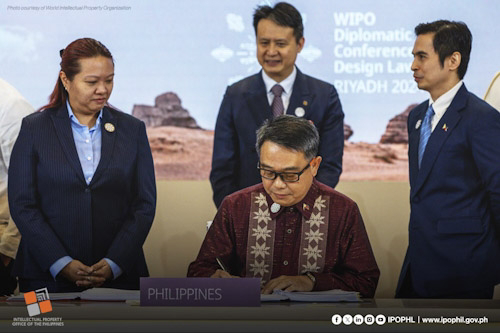COURTESY: https://www.ipophil.gov.ph
The Philippines, alongside 193 other member states of the World Intellectual Property Organization (WIPO), has made waves by officially adopting the Riyadh Design Law Treaty. This momentous agreement marks the end of nearly two decades of multilateral negotiations. But why does this matter so much? Well, it’s all about giving designers a smoother ride in protecting their creations. The treaty essentially creates a universal framework that updates and simplifies the rules surrounding design protection. This is great news for creatives everywhere!
IPOPHL Director General Rowel S. Barba couldn't have said it better: “Together with WIPO Member States, the Philippines shares the common goal that designers should be able to protect their work more easily and be given the bigger opportunity to scale up globally.” This treaty is all about cutting through the red tape, allowing designers to focus on what they do best—being creative and innovative.
One of the most significant advantages of the Riyadh Design Law Treaty is how it makes the design application process more predictable and cost-efficient. By setting limits on application requirements, it eliminates many of the hurdles that designers face. Imagine being able to file multiple designs in one go and representing those designs in various formats like drawings, photographs, or even videos. It’s like giving designers a Swiss Army knife of options to present their work!
The treaty also introduces several applicant-friendly features. There’s a 12-month grace period for disclosures and a six-month option to keep designs unpublished from the filing date. This is a game-changer for those who might have missed deadlines in the past. Plus, with simplified renewal procedures and a push for e-filings and digital processes, it’s like the treaty is giving designers a VIP pass through the bureaucratic maze.
The timing of this treaty couldn’t be better for the Philippines. Under the leadership of President Ferdinand Marcos, Jr., there’s a strong focus on investing in the creative economy. The Riyadh Design Law Treaty aligns beautifully with the country’s long-term goals, especially in promoting and developing creative and innovative industries. For developing and middle-income countries like the Philippines, this treaty is a vital stepping stone towards achieving the 2030 Sustainable Development Goals and the Philippine Development Plan 2023-2028.
Director General Barba praised the efforts of the treaty’s organizers, highlighting the excellent leadership of the conference president, Abdulaziz Muhammad Al-Suwailem, CEO of the Saudi Authority for Intellectual Property (SAIP). “Your dedication and trust in the process was felt throughout the conference that led us to a meaningful, consensus-driven and balanced outcome in the draft text,” Barba noted. It’s clear that this treaty was a labor of love and determination from all parties involved.
This isn’t the first time WIPO member states have come together to achieve something remarkable. Earlier this year, they adopted the WIPO Treaty on IP, Genetic Resources, and Associated Traditional Knowledge. The Philippines remains committed to collaborating with the international community to ensure these treaties are successfully implemented.
Barba emphasized the country’s dedication to working closely with national agencies to swiftly submit the consensus document for the Riyadh Design Law Treaty. “The Philippines reaffirms its commitment to continued collaboration with the international community to ensure the successful implementation of the historic treaties we have worked on in advancing design protection and inclusive innovation,” he said.
In conclusion, the adoption of the Riyadh Design Law Treaty is a landmark achievement that promises to revolutionize the way design protection is handled globally. For the Philippines, it’s a testament to the country’s commitment to nurturing its creative industries and fostering innovation. With this new framework in place, designers can look forward to a future where their creativity is not only protected but also encouraged to thrive on the global stage. Here’s to a new era of design excellence!





No comments:
Post a Comment